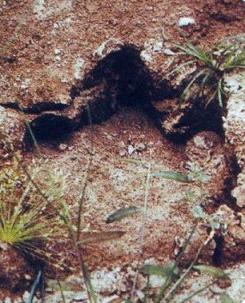TOUR DE FORCE, HEBREWS 11: 37-38. C3Q67 PRESAGE 74.
https://youtu.be/qng_KwUi0pQ
river monsters. below.
https://youtu.be/bhbAh9AMN3Y
The Mokele-Mbembe

A bit more well-known than the Mahamba, the Mokele-mbembe is described
as having a long neck and tail, with round shaped tracks with claws. It
is believed to be a modern dinosaur due to the fact that it matches
these characteristics of a dinosaur that was alive sixty-five years ago,
the sauropod. The natives of central Africa gave it its name, meaning
"one that stops flow of rivers." The natives have also given it the
description of being a reddish-gray color, about ten meters in length,
having legs like an elephant, a snake like head, and a neck that
stretches as if it were a snake itself.
Just like the Mahamba, there is great fear of the Mokele-mbembe. Natives have claimed it to be a killer, and sometimes avoid deep waters in fear of encountering it.
Just like the Mahamba, there is great fear of the Mokele-mbembe. Natives have claimed it to be a killer, and sometimes avoid deep waters in fear of encountering it.
In
this video, Africans discuss their fear of the water when they see the
"water ghost" in the Congo River. The people being interviewed in the
video firmly believe in it's existence, describing it as a dinosaur.
https://youtu.be/viCsoaw66mk
Sightings of this modern dinosaur have been occurring for over 200
years. “In 1776, French missionaries passing through the forests
reported finding huge footprints in the ground. The clawed prints were
three feet in circumference and were spaced about seven feet apart”
(Strickler). Normally one would assume the tracks just to belong to an
elephant, but elephants do not have claws. After further talking with
the natives, the French missionaries knew they had come across a monster
of some sort. This assumption continued all the way to 1913 when a
German explorer claimed to see a sauropods, and again in 1932 when
“world famous zoologist and biologist, Ivan T. Sanderson” made a
discovery (Strickler). "The most terrifying sound I have ever heard,
which sounded like an on-coming earthquake or an exploding, nearby
robot, suddenly greeted us from a large underwater cave” (Strickler).
Sanderson summed up his journey as:
"I
don't know what we saw, but the animal, the monster, burned itself into
my retinas. It looked like something that ought to have been dead
millions of years ago. As a scientist, I should have been happy, of
course, but this encounter was so frightening, so nasty that I never
want to see it again."

After
Sanderson’s publishing, the world began to become fascinated with the
Mokele-mbembe, and more and more expeditions were occurring. An American
scientist conducted a second expedition in 1932, when there was
a discovery of a “large-hippo like animal” in the water (True). In 1972
and 1976, another American scientist made two expeditions, talking with
the local natives about this monster. A German engineer made a trip to
Lake Tele in 1980, claiming that he had seen the 30-35 foot creature and
photographed it. American, German, and British expeditions all
continued into the 1980s, never discovering new information. A few have
claimed to have taken photographs of the dinosaur, all of which have
been disproved.
 Sightings of this modern dinosaur have been occurring for over 200
years. “In 1776, French missionaries passing through the forests
reported finding huge footprints in the ground. The clawed prints were
three feet in circumference and were spaced about seven feet apart”
(Strickler). Normally one would assume the tracks just to belong to an
elephant, but elephants do not have claws. After further talking with
the natives, the French missionaries knew they had come across a monster
of some sort. This assumption continued all the way to 1913 when a
German explorer claimed to see a sauropods, and again in 1932 when
“world famous zoologist and biologist, Ivan T. Sanderson” made a
discovery (Strickler). "The most terrifying sound I have ever heard,
which sounded like an on-coming earthquake or an exploding, nearby
robot, suddenly greeted us from a large underwater cave” (Strickler).
Sightings of this modern dinosaur have been occurring for over 200
years. “In 1776, French missionaries passing through the forests
reported finding huge footprints in the ground. The clawed prints were
three feet in circumference and were spaced about seven feet apart”
(Strickler). Normally one would assume the tracks just to belong to an
elephant, but elephants do not have claws. After further talking with
the natives, the French missionaries knew they had come across a monster
of some sort. This assumption continued all the way to 1913 when a
German explorer claimed to see a sauropods, and again in 1932 when
“world famous zoologist and biologist, Ivan T. Sanderson” made a
discovery (Strickler). "The most terrifying sound I have ever heard,
which sounded like an on-coming earthquake or an exploding, nearby
robot, suddenly greeted us from a large underwater cave” (Strickler).
musical
option-click hereMUSIC CLICK
https://youtu.be/qkxBb7rp7_w










 music option
click-https://www.box.com/s/n4j4z17ruvdc6emuhex6
music option
click-https://www.box.com/s/n4j4z17ruvdc6emuhex6



https://youtu.be/qkxBb7rp7_w










 music option
click-https://www.box.com/s/n4j4z17ruvdc6emuhex6
music option
click-https://www.box.com/s/n4j4z17ruvdc6emuhex6


Subscribe to:
Post Comments (Atom)


No comments:
Post a Comment